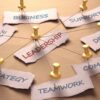Have you ever had the experience of going to work to finish two or three essential tasks by the end of the day? And once you are at the office, you start working, but before you know it, it’s the end of your shift, and you are surprised to discover that you haven’t finished half of your set tasks. What happened?
The answer is simple – you’ve allowed other things or people to dictate your day. You got a message, then you had a chat with your colleague, sometime later an email interrupts your work, so you’ve spent maybe an hour or two effectively working, which is genuinely detrimental to your productivity. Now consider this: it’s the end of the year, and you found yourself thinking that another year has gone by and you still haven’t made any progress on something you wanted to do. Maybe you wanted that promotion, go back to school, or start the side business, but you didn’t make it happen. If this sounds familiar, then you are living the life of distraction.
Attention vs. Time
We might think that if we increase our productivity, all we have to do is better manage our time. But time isn’t the only thing we need to address. Attention is vital to our productivity, and understanding it and learning how to take advantage of it is what will ultimately help us become our most productive selves. Attention is limited, just like time. However, unlike time, we can control our attention. By learning how to manage our attention and use it effectively, we can make real productivity gains.
Control Your Attention and You Will Control Your Life
In controlling your attention, you are managing your productivity. But not only that. Attention control is the secret to living a life of choice, the life you want to live. But, in an age of distraction, that is often easier said than done. We are constantly distracted, at home, at work, in our free time, in traffic.
What is a distraction? As Nir Eyal, the author of the book ‘Indistractable: How to Control Your Attention and Choose Your Life’ explains, distraction is anything we do that pulls us away from what we plan to do. It’s the things we do without intent. But, distractions are a personal thing. What is a frivolous pastime for one person, it’s completely fine for another. It only depends on the intent.
So, what is the proper course of action? Nir Eyal has the four-step guide to avoiding distraction:
- Learning how to manage the internal triggers that cause us to become distracted;
- Learning how to plan our time;
- Learning how to manage external triggers (emails, meetings, social media, etc.);
- Learning how to use technology against itself.
Discover how to fight the distractions in your everyday life, and how to consistently connect with your leadership team.









